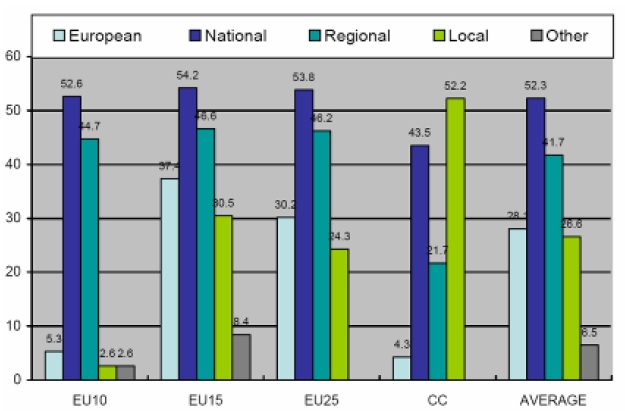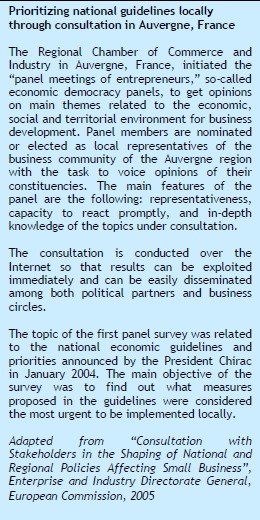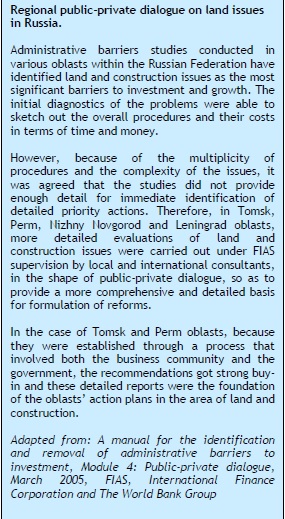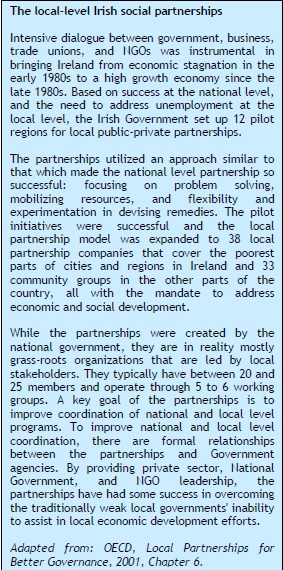The issue: PPD should not focus exclusively on the national level; PPD at the local level can have tremendous impact on the investment climate and the enabling environment for private sector growth. It is important for business and civil society to engage in dialogue with local levels of government that often have the power to take – and implement – decisions that affect private sector development. Local PPD can also address national issues to ensure that national policies meet local needs. Holding events in only the capital city also skews participation by making it harder for small businesses based in outlying provinces to get involved. Most principles of running a PPD at the national level apply at the subnational level. But attention should be given to organizational and process issues to ensure that the PPD results in elimination of obstacles to investment and private sector growth.
Public-private dialogue is desirable at all levels of decisionmaking down to the most local possible level, especially as this is likely to be more practically capable of involving micro-entrepreneurs, SMEs and other local stakeholders.
- Local level public-private dialogue allows local issues and solutions to be identified and taken to decentralized decision-makers or channeled upwards to the appropriate level of authority at which they can be solved.
- Local dialogue can contribute to effective implementation of national policies. It may be particularly effective when explicitly aligned with dialogue taking place at national or regional level.
- Local level dialogues can especially benefit from use of participatory tools, capacity building initiatives, and the use of local and neutral facilitators.
C.8.1. Local-level dialogue can improve national-level policy
National-level PPD includes a limited number of representatives from the public and private sectors. This means that a relatively small number of private sector institutions have influence on policy, and regional and local governments are often excluded or underrepresented in the dialogue. This problem can be rectified by local-level PPD on national-level issues.
Local PPD throughout a nation can provide a wide range of inputs to national-level policy development and ensure that national policies meet differing local needs. Local PPD also provides ideas for addressing regional disparities and assisting impoverished regions.
Local PPD is also important to obtain local buyin to national policies. Local public officials are often the ones who implement decisions taken at regional or national levels. As such, they can make or break the success of PPD in practice. Thus, strengthening dialogue between central and local officials often is as important as strengthening dialogue between the public and the private sectors.
It is important for PPD leaders and facilitators to design mechanisms to ensure a regular flow of communications between local and national level PPD venues.
Ideally, the national government, along with its partners in dialogue at the national level (business associations, etc.) will encourage and support local level PPD. But it is important that the participants in the local PPD have developed the forum and priority issues. National level support and involvement is important to motivate local stakeholders to participate in PPD and to ensure that the national government will act on issues and recommendations identified at the local level. A bottom-up, grass roots approach is also important since local stakeholders must take “ownership” of the PPD venue and its output – if they have little commitment the PPD will fail.
C.8.2. Local-level dialogue can achieve important improvements in regional economic competitiveness
Local PPD can focus on elimination of barriers to private sector development that are caused by local government regulations and practices. Businesses operating in the region can advise the local government on the barriers, and the two can work together to eliminate them. They can also collaborate on initiatives to increase their region’s competitiveness.
In many regions, local PPD is part of a broader partnership on local economic development. Such partnerships can establish a vision for the region’s economy and work toward that vision through joint projects and recommendations for elimination of policy and legal obstacles. It is important to include local business and government leaders along with others whose support will be necessary to the success of the endeavors.
SMEs and local authorities participate most effectively in dialogues on tangible, hands-on matters, such as discussions of administrative processes (registration, tax administration, customs clearances, etc). In the early stages it is important that the parties identify “quick wins” – reforms that can be implemented by the local government with immediate tangible benefits to the private sector. This builds credibility and trust, and leads to more interest in and commitment to the forum for dialogue.
Effective communication is paramount at the sub-national level. In its recommendations, the Enterprise and Industry Directorate General of the European Commission reports that responses from public administrations to a survey regarding their level of activity reveal that “meetings with social partners” as “method currently used” are mentioned more often by regional and local authorities than national governments. On the other hand, “consultation by written procedure” is used more often by national governments than regional and local ones. Since it is easier for local governments to have face-to-face consultations than it is for a national government with many more stakeholders, local governments have no excuse to not use the more effective method of face-to-face dialogue on issues.
All participants in the dialogue must understand the context for the consultation and the goals for the dialogue. Otherwise the dialogue will be unfocused and unproductive, with each stakeholder expecting to discuss only the issues that are of immediate importance to his or her business. Some education, training and outreach are helpful so stakeholders understand what to expect from PPD, how to engage in productive dialogue, and what are the most important economic issues for their region.
C.8.3. Acknowledging local differences is a key success factor, in particular in post-conflict environments
In post-conflict environments, or when interests or ethnic groups are clearly divided, it may be important to address the differences, including economic conditions, culture, and languages. In regions that have some relatively wealthy sub-regions and some impoverished sub regions, it is important to address the economic problems in the impoverished areas. When ethnic groups have a history of conflict, the facilitators must be cognizant of various sensitivities.
During the Bulldozer Initiative in Bosnia, six regional committees were created; each covering a delimited region that went over the boundary line that divides the two of Bosnia’s ethnically composed entities. Each regional committee had therefore stakeholders speaking at least two of the three country’s official languages: Bosnian, Croatian, and Serbian. Although the three languages are quite similar, some stakeholders might have felt insulted if the PPD working documents were not in their preferred language. For that reason, the Bulldozer coordination unit had to invest into creating three separate versions of each document. While it increased the transaction cost of the partnership, it enabled all the stakeholders to feel comfortable in participating in the joint discussions and action plans.
Bringing together communities or regions that have been torn apart by conflict requires high-quality facilitation. If possible, an outside facilitator with experience in post-conflict situations should be brought in to co-facilitate and mentor a respected neutral local facilitator.
C.8.4. Local-level PPD should be based on an appropriate geographical coverage
Local PPD can be at the municipality, county, or other sub-national political level, or can be based on an economic region that crosses political boundaries. Since PPD is primarily focused on economic growth and private sector development, the regions should be based on economic commonalities. For example, it might not be best to combine a primarily agricultural area with a primarily industrial area. Or it might not make sense to limit the region to a geographic area that is interdependent with another area.
Each of Croatia’s 21 counties has a Local Economic and Social Council, but the European Union has delineated four economic regions. Some of the counties are part of a multi-county economic region, with supply chains, workers, and companies constantly working across county borders. It is likely that the Councils will be redefined to cover economic regions, and will be more effective. Municipal-level dialogue can (and already does) also take place to cover obstacles that are under the purview of the municipal governments and to feed issues to the regional and national-level councils.
C.8.5.Strengthening local-level Chambers of Commerce can help local dialogue
Developing the management, communication, presentation, negotiating and advocacy skills of local Chambers of Commerce can have a big effect on promoting local level dialogue. Ideally the chambers themselves can train their private sector members in ways to engage effectively in dialogue with government.
In the EU, for instance, most chambers have regional programs that are geared at servicing local entrepreneurs, but also to conduct dialogue with local governments. The European Commission reports that, according to a survey of business associations and chambers of commerce across the EU member countries and the candidate countries (CC), many of the associations indicated that they have regional (41.7 percent) or local branches (26.6 percent). In the candidate countries (where one could assume that centralized institutions do not work as well as in the EU member countries), the majority of replies did come from the business organizations who considered themselves as local (52.2 percent).

C.8.6. Local and regional approaches often work well combined with cluster approaches
USAID in particular has focused on promoting dialogue in regional industry clusters, with considerable success. Most clusters are made up of a group of businesses in an industry and supporting institutions that are mostly located within the same geographic area. They are often among the main drivers of economic development in that area and need to be at the center of PPD in that region. The supporting institutions usually include the local government(s), and in most cases the cluster’s dialogue includes PPD on obstacles caused by the local government. These obstacles are important not only because they affect a key industry – they also tend to affect all industries in the region.



